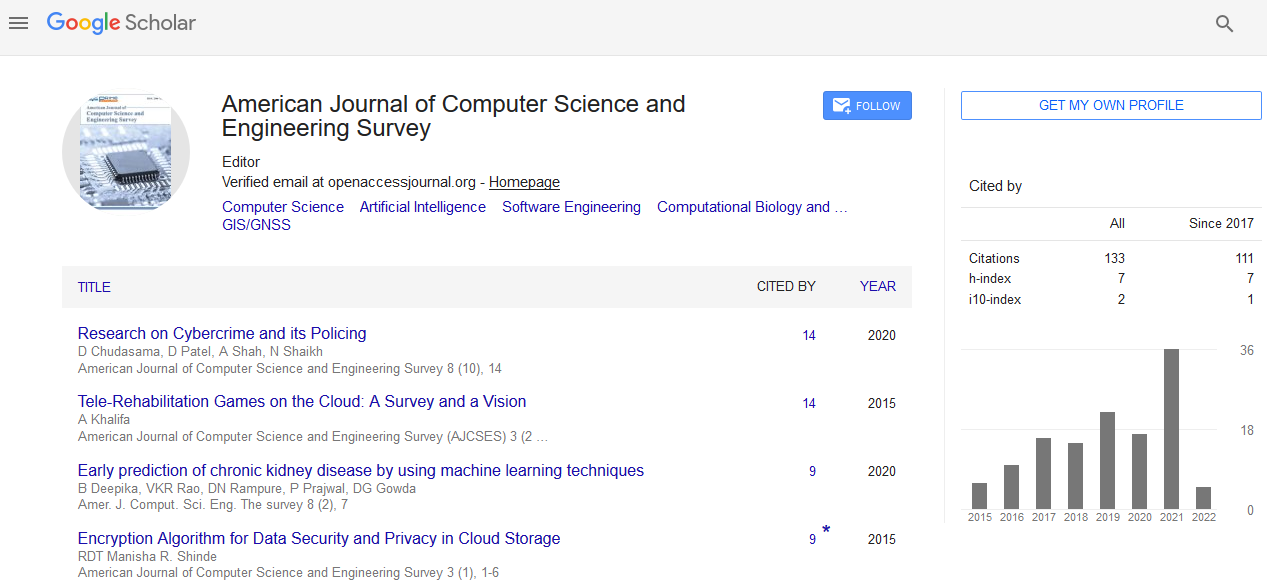Opinion - (2023) Volume 11, Issue 2
Exploring Theoretical Models for Assessing Digital Competence Levels in Students
Isabella Rossi*
Department of Computer Science, University of Pisa, Italy
*Correspondence:
Isabella Rossi,
Department of Computer Science, University of Pisa,
Italy,
Email:
Received: 31-May-2023, Manuscript No. ipacses-23-17187 ;
Editor assigned: 02-Jun-2023, Pre QC No. ipacses-23-17187 (PQ);
Reviewed: 16-Jun-2023, QC No. ipacses-23-17187 ;
Revised: 21-Jun-2023, Manuscript No. ipacses-23-17187 (R);
Published:
28-Jun-2023, DOI: 10.36846/2349-7238.23.11.14
Introduction
In the new worldwide scene, computerized abilities are a vital
expertise for understudies to jump all over new learning chances,
train to satisfy the needs of the work market, and contend
in the worldwide market, while likewise imparting successfully
in their regular and scholastic lives. This article presents
research pointed toward relating the effect of individual factors
on the advanced ability of specialized critical thinking in
Spanish understudies from 12 to 14 years of age. A quantitative
technique with a cross-sectional plan was utilized. An example
of 772 understudies from 18 Spanish instructive foundations
was utilized. For information assortment, an evaluation test
was planned in view of an approved marker model to assess
students’ computerized capability taking as a model the European
system for the improvement of computerized skill.
Description
Intervention models were utilized and hypothetical reference
models were made. The outcomes permitted us to check the
impact of individual, innovation use, and attitudinal factors in
the improvement of computerized ability in specialized critical
thinking. The discoveries lead to the end that orientation, securing
of computerized gadgets, and normal use don’t decide
a superior degree of skill. Data and Correspondence Advancements
(ICTs) have emphatically influenced the new worldwide
scene, changing how individuals impart, work, study, and
carry on with work. ICTs can further develop training quality
and openness, however they may likewise present difficulties
as far as computerized partitions and understudies’ abilities.
Computerized training, comprehended as the arrangement of
information (knowing), abilities (skill), and mentalities (knowing
to be) that are expected for the appropriate obtaining and
advancement of computerized capability, is a crucial prerequisite
to coordinate innovation into the instructing and growing
experiences for schoolchildren. Computerized skill will become
fundamental for nations’ future financial and social success
and, thus, its initial improvement in youngsters and youth
ought to be viewed as an essential need. The term computerized
capability is much of the time utilized in examination to
allude to a bunch of capacities that are required in the computerized
climate. According to our perspective, computerized
ability alludes to the arrangement of information, abilities, and
mentalities that is expected for the protected, basic, and capable
utilization of advanced innovation in the individual, expert,
and social circles. For north of 10 years, in the European Association
and past its boundaries, the Structure for Creating and
Grasping Computerized Skill in Europe (DigComp) has been a
wellspring of normal comprehension of what advanced capabilities
are and has given a premise to the turn of events and
evaluation of advanced ability, filling in as a source of perspective
for advanced skills strategy. To evaluate the advanced ability
of schoolchildren and look at the impact of various individual
factors on it is a significant undertaking, since the outcomes
got give applicable data to direct the utilization of innovation in
training communities.
Conclusion
Having a bigger number of computerized gadgets and utilizing
them all the more habitually doesn’t guarantee that understudies
will have a superior degree of computerized capability
in TPS. At last, it is important that the essential requirement of
this exploration is the atomized idea of the work, which centres
around looking at the impact of explicit factors on a specific
computerized capability (specialized critical thinking) in a
particular region (critical thinking) of computerized skill. This
is unfavourable to the improvement of a more comprehensive
perspective on the concentrated on peculiarity.
Citation: Rossi I (2023) Exploring Theoretical Models for Assessing Digital Competence Levels in Students. Am J Comp Science.
11:14.
Copyright: © 2023 Rossi I. This is an open-access article distributed under the terms of the Creative Commons Attribution License, which permits unrestricted use, distribution, and reproduction in any medium, provided the original author and source are credited.

